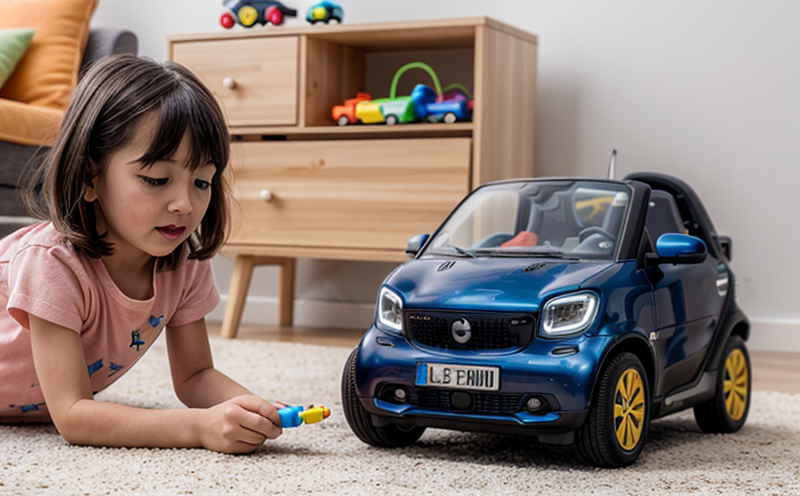ISO/IEC 29151 Personally Identifiable Information Protection Test
The ISO/IEC 29151 standard is designed to ensure the protection of personally identifiable information (PII) in smart and connected toys. This service focuses on testing the effectiveness of security measures implemented by manufacturers to safeguard PII data, which may include names, addresses, email addresses, or any other information that can be used to identify an individual.
Given the increasing prevalence of internet-connected devices for children, it is crucial to ensure that these toys do not inadvertently expose children’s sensitive personal data. This service ensures compliance with international standards and regulations such as ISO/IEC 29151, which provides a framework for protecting PII in software systems.
The testing process involves several steps aimed at identifying vulnerabilities and ensuring robust security practices. This includes assessing encryption methods used to protect the information, evaluating access control mechanisms, verifying data minimization policies, and checking for any potential data breaches or leaks.
Our team of experts will conduct a comprehensive review of your toy's software and hardware components to identify areas where PII might be at risk. We use state-of-the-art tools and methodologies to simulate real-world scenarios that could exploit these vulnerabilities. The testing process is designed to provide peace of mind for parents, educators, and children by ensuring the highest level of data protection.
In addition to technical aspects, we also consider regulatory compliance issues such as GDPR (General Data Protection Regulation) and COPPA (Children's Online Privacy Protection Act). By adhering to these standards, manufacturers can avoid legal penalties and maintain customer trust. Our service not only helps in identifying weaknesses but also provides actionable insights that can be used to enhance the overall security posture of your smart toys.
Our approach is tailored to meet the unique requirements of toy manufacturers who are developing cutting-edge products with connectivity features. By leveraging our expertise in both software and hardware testing, we ensure that all aspects of data protection are addressed comprehensively. This includes examining how PII interacts within different environments—from local networks to cloud-based services.
The results from this service provide you with detailed reports highlighting any findings related to potential risks associated with PII handling practices. These reports also include recommendations for improvements based on best practices outlined in ISO/IEC 29151 and other relevant standards.
Scope and Methodology
| Test Objective | Description |
|---|---|
| Evaluate Encryption Strengths/Weaknesses | We assess the strength of encryption algorithms used to protect PII. This includes checking key sizes, cipher types, and overall implementation quality. |
| Access Control Assessment | This involves evaluating authentication mechanisms employed by the toy’s software to ensure only authorized users can access sensitive information. |
| Data Minimization Practices | We examine whether the toy collects less data than necessary and deletes it promptly after usage, thus reducing exposure risks. |
| Vulnerability Scanning | Our team uses automated tools to scan for known vulnerabilities in both software and firmware. This helps identify any potential entry points for malicious actors. |
The methodology for conducting the ISO/IEC 29151 Personally Identifiable Information Protection Test is rigorous yet flexible, allowing us to adapt our approach based on specific product characteristics. From initial consultations through final report delivery, every step follows strict protocols outlined in the standard.
Industry Applications
- Data Protection for Connected Toys: Ensuring that PII remains secure when transmitted over networks or stored locally.
- Regulatory Compliance: Helping toy manufacturers comply with international standards like GDPR and COPPA.
- Risk Management: Identifying potential threats early in the product lifecycle to mitigate risks effectively.
- Innovation Support: Providing feedback on how current security measures can be improved while supporting new features development.
The application of this service extends beyond just compliance; it supports innovation by offering valuable insights into best practices that enhance user experience without compromising privacy and security.
Environmental and Sustainability Contributions
- Promoting Responsible Manufacturing: By ensuring robust data protection measures are in place, we contribute to responsible manufacturing practices that prioritize child safety and well-being.
- Encouraging Sustainable Design Practices: Our testing encourages manufacturers to adopt sustainable design principles by minimizing unnecessary data collection and promoting efficient resource use.
The environmental impact of this service lies not only in its direct contribution towards protecting children's privacy but also indirectly through fostering more thoughtful and responsible product development processes. This aligns with broader sustainability goals within the toy industry.





